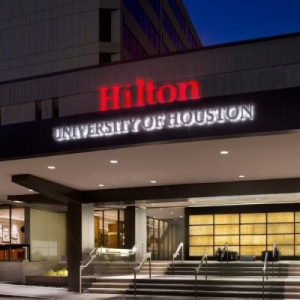
Partnerships involving hotels, universities and developers are becoming extremely common. And, while not widely known, hotels, developers and institutions of higher education have collaborated in a myriad of ways for decades.

Photo from the Conrad N. Hilton College of Hotel and Restaurant Management
Most notable in Texas, the University of Houston has enjoyed an enviable relationship for many years with Hilton Hotels through the university’s Conrad N. Hilton College of Hotel and Restaurant Management. The college, founded in 1969 and endowed by late hotelier icon Conrad N. Hilton, is physically connected to the Hilton University of Houston Hotel and Conference Center. Students have the opportunity to have an on-campus, full-service hotel at their disposal to provide hands-on learning as they pursue degrees in hospitality management. The Hilton College is so successful it recently expanded into San Antonio.
Hotels and conference centers on university campuses are a natural for collaboration. Developers usually are also included in the public-private partnership coalition because of the potential retail they can attract. The various and appropriate types of retail can generate significant revenue to the partnership.
The University of Texas at Austin’s highly touted AT&T Executive Education and Conference Center was constructed adjacent to the UT campus. It regularly hosts conferences, seminars, continuing education sessions and executive education programs.
The AT&T Center also boasts 300 hotel rooms and more than three-dozen meeting rooms. Like other hotels and conference centers throughout the country, the facility has a direct impact on the local economy and creates a long-term revenue stream for the university.
Elsewhere in the state, Texas A&M University issued a request for proposals (RFP) in 2014 for demolition of Cain Hall to make way for a 150 to 200-bed franchise or boutique hotel that would include a conference center and 1,000-space parking garage. With a proposed location just across from Kyle Field, the facility would surely be in high demand. In announcing the project, A&M officials said they planned to engage and collaborate with contractors through a public-private partnership.
Similar projects are being undertaken nationwide. Last year, Arkansas State University (ASU) announced it was negotiating with private-sector partners to build a hotel and conference center on its campus. University officials saw the project as a way to increase revenue and produce educational opportunities and internships in hospitality management for its students.
Another ground lease agreement was sought by the University of Tennessee Health Science Center to secure a private-sector partner to transform the 19-story Medical Center Towers and parking garage into a new hotel and conference center.
Like the University of Houston, Cornell University has a hotel on its campus that complements its hotel management and administration degree program. Cornell has operated the hotel since it was built in 1922. Similarly, Michigan State’s Kellogg Hotel and Conference Center is a training facility for its School of Hospitality Business.
Because hotels, retail development and conference centers add significantly to university campuses, all three are in high demand. But, construction, development and operational costs are usually prohibitive without partnerships with private-sector firms. Collaborations are attractive to all parties. University campuses provide great opportunities to developers, hotels and conference centers because sports activities, university-hosted conferences and events offer a steady stream of consumers.
More than 85 colleges nationwide currently have hotels or inns on their campuses. Expect that number to increase in the near future.
And to find out about those opportunities before they happen, rely on SPI’s government contracting research experts to identify them for you.
